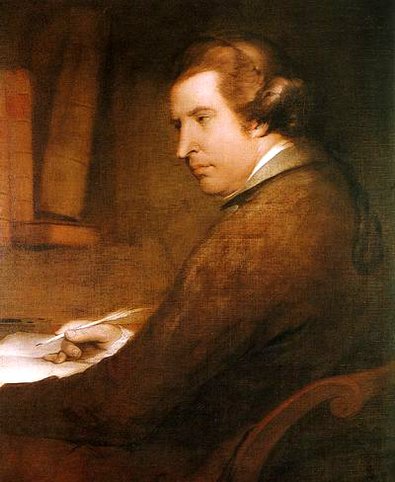Family and Country
 "We begin our public affections in our families. No cold relation is a zealous citizen. We pass on to our neighbourhoods, and our habitual provincial connexions. These are inns and resting-places. Such divisions of our country as have been formed by habit, and not by a sudden jerk of authority, were so many little images of the great country in which the heart found something which it could fill. The love to the whole is not extinguished by this subordinate partiality. Perhaps it is a sort of elemental training to those higher and more large regards, by which alone men come to be affected, as with their own concern, in the prosperity of a kingdom so extensive as that of France. "
"We begin our public affections in our families. No cold relation is a zealous citizen. We pass on to our neighbourhoods, and our habitual provincial connexions. These are inns and resting-places. Such divisions of our country as have been formed by habit, and not by a sudden jerk of authority, were so many little images of the great country in which the heart found something which it could fill. The love to the whole is not extinguished by this subordinate partiality. Perhaps it is a sort of elemental training to those higher and more large regards, by which alone men come to be affected, as with their own concern, in the prosperity of a kingdom so extensive as that of France. "
Edmund Burke: Reflections on the Revolution in France. (1790). Para 331
“What matters is not the individual as an atom, but the collective capacity created by individuals considered as a people or society. Following Aristotle, then, for Burke man is a social animal, a politikon zoon, an animal whose nature is to be in society. Indeed, there is little or no sense to be attached to the idea of man as an atom, wholly cut off from human society. The human self is a social self. This is an idea with vast and often still unrecognized implications…
“Unlike Hobbes, Locke and Rousseau, then, Burke begins not with a state of nature, but with what is given – that is, with the fact of human society itself. Human beings grow up within human society, and this is what much of their humanity consists in. Different societies may in fact differ in various ways – rich or poor, open or closed, centralized or dispersed, warlike or peaceable. But each has a social order, which links people together in an enormous and ever-shifting web of institutions, customs, traditions, habits and expectations built up by innumerable interactions over many years…
“These institutions are ultimately grounded in feeling and emotion, which guide and direct man’s reason. They are bound together by affection, identity and interest. They matter for three reasons. First, they constrain each other, competing and cooperating as required to survive, diffusing power across communities, and providing a social challenge to state power. Secondly, they give shape and meaning to people’s lives, as work or play, setting rhythms to the day or year, creating overlapping identities and personal loyalties. Revisiting Burke’s famous words in the Reflections: ‘To be attached to the subdivision, to love the little platoon we belong to in society, is . . . the first link in the series by which we proceed towards a love to our country and to mankind.’ Finally, institutions trap and store knowledge. Composed of a myriad private interactions, traditions and practices as it is, the social order becomes a repository of shared knowledge and inherited wisdom.”
Jesse Norman. Edmund Burke: The First Conservative.2013. Basic Books.
[Picture: Portrait of Edmund Burke by James Barry, Provost’s House, Trinity College, Dublin.]